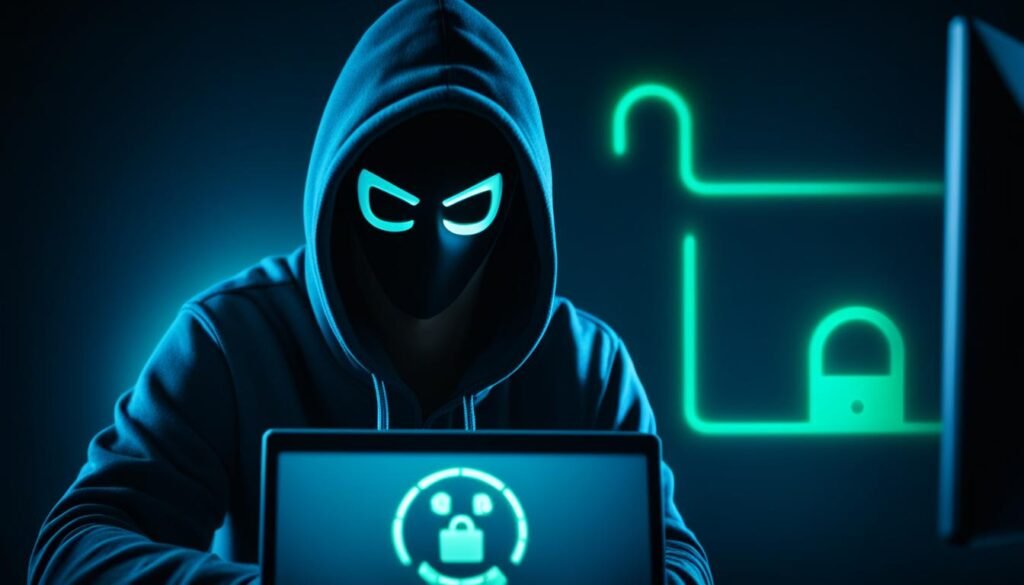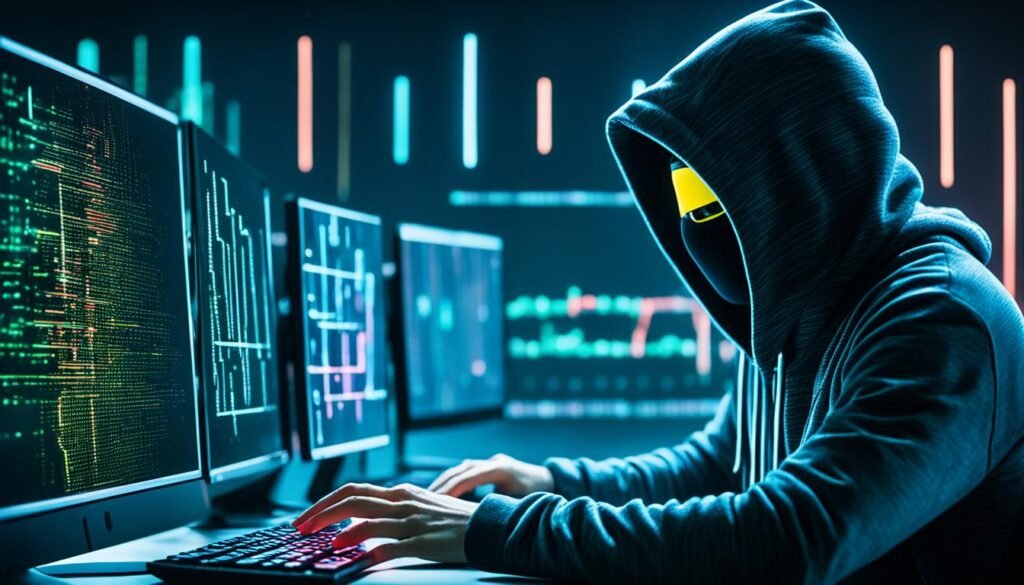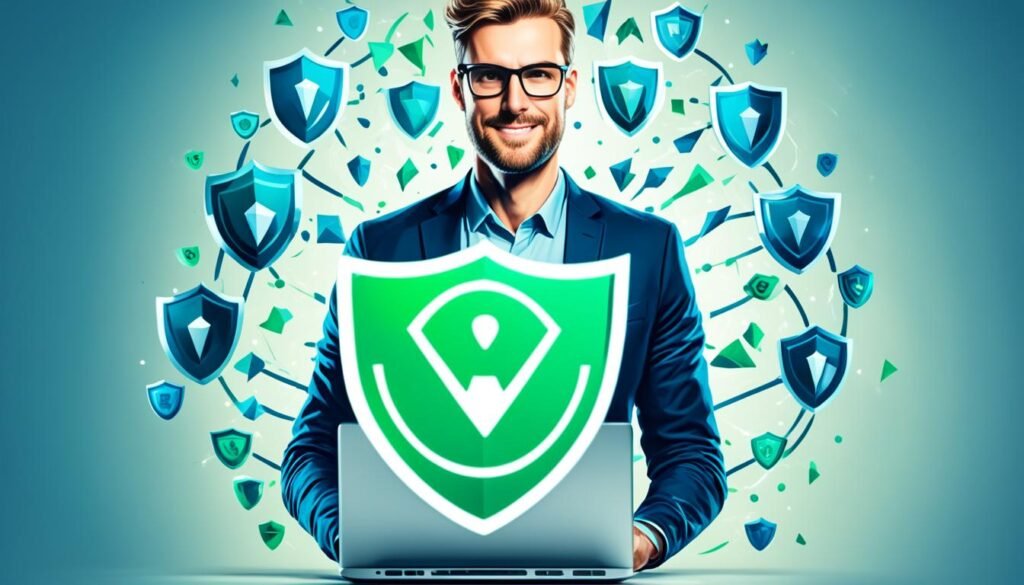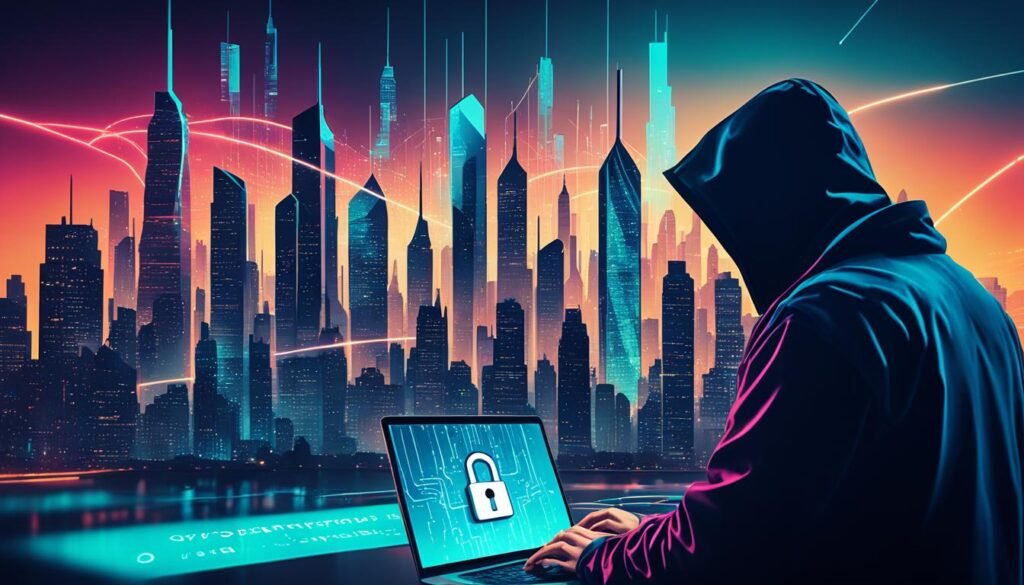Imagine surfing the web without worrying about being watched all the time. Your data shouldn’t be taken without your okay. With more online tracking, keeping your info safe and secure online is key.
Online anonymity is super important today. It lets us share our thoughts and talk to others without mixing our online and real lives. But, data brokers make a lot of money by selling our info without asking us first. This constant watching and the risk of identity theft make keeping your online life private vital.
Learning about online anonymity shows it’s not just one thing. It takes many steps to stay hidden. Tools like VPNs, used by over 30% of internet users, help hide your IP address. Secure systems like Tails and Whonix also play a big part.
For emails, ProtonMail keeps your messages safe with end-to-end encryption. To stay private, turn off cookies, use browsers like Tor or Brave, and try services like Temp Mail. These steps are key in a world where sharing too much online can put you at risk.
Big names like Google and Facebook use your data for ads. But, you can fight back. DuckDuckGo focuses on keeping your info private. Also, use strong passwords and two-factor authentication to boost your online security.
With laws like the UK’s Online Safety Bill, our right to privacy is under threat. This guide will show you how to protect your online life. It also looks at the right and wrong of staying anonymous online.
Why Online Anonymity Matters
In today’s digital world, keeping your online identity hidden is key. Most internet users, 86%, try to hide their online tracks. And 55% aim to avoid being watched by certain groups. This shows how important privacy is.
Anonymity keeps you safe and protects your freedom in our connected world.
Privacy Protection
Being anonymous online is key to keeping your privacy safe. By hiding your identity with encryption and other tools, you stop others from seeing your personal info. Sadly, 21% of internet users have had their social media hacked, and 11% have had their identities stolen.
This shows how vital it is to keep your online connection secure to stay safe.
Safety and Security
For many, being anonymous online is a safety issue. People like whistleblowers, activists, journalists, and victims of abuse often face threats online. Without anonymity, they’re more likely to be stalked or harassed.
Shockingly, 12% of internet users have been stalked online, and 6% have had their reputation damaged. A secure connection with encryption is crucial for staying safe online.
Freedom of Expression
Lastly, being anonymous online lets you speak your mind freely. It’s key for sharing thoughts and joining discussions without fear of being silenced or punished. This is especially important for those in minority groups who use fake names and profiles to speak out.
Even though 59% doubt they can stay completely anonymous, it’s a way to express yourself safely. It helps protect your identity and keeps you out of harm’s way.
Threats to Online Anonymity
In today’s digital world, the threats to staying anonymous online are growing. Efforts to keep freedom of expression are facing challenges from new laws worldwide. For example, in the UK, politicians want strict rules after Sir David Amess’s death. They suggest the Online Safety Bill, which would make social media platforms check who you are before you post.
But, some think these rules won’t solve the problem. A Twitter study found 99% of banned accounts were known, not hidden. This makes us question if taking away anonymity really helps stop online abuse.
Removing anonymity can hurt some groups a lot. People like LGBTQ+ individuals, sex workers, and activists need it to stay safe. In places like the Middle East and North Africa, police use fake profiles to catch people who are just trying to be themselves online.
Companies like Facebook have made users use their real names, which can be dangerous for some. The internet is a tricky place for privacy, and we need to find better ways to keep users safe. Using VPN or other creative methods could be the answer without taking away our privacy.
We need a way to keep the internet free while still keeping it safe. Leaders should think about this to make the internet a better place for everyone.
Ethical Considerations Around Online Anonymity
Online anonymity is a tricky topic. It helps protect your privacy but can also lead to bad things like cyberbullying and illegal acts. We need to find a way to balance these concerns.
Balancing Privacy and Responsibility
Privacy is a big plus of being anonymous online. It keeps your data safe from prying eyes and companies tracking you. People like whistleblowers and journalists use it to stay safe and speak out.
Anonymity lets people share their thoughts freely. But, it can also hide those who bully or harass others. We need to find a way to be private but also act responsibly online.
Transparency and Accountability
Being open and accountable is key when using anonymity tools. We should make sure users feel safe but know the rules. Setting clear guidelines can help stop bad things like cyberbullying.
Lawmakers need to think about privacy and security when making rules. This way, we can keep our rights and stay safe online.
Legal and Responsible Use
We all need to work together to use anonymity tools right. Users should follow the law, and platforms should stop abuse. It’s important to teach people why being responsible online matters.
By pushing for openness and privacy, we can make a safe space. This way, we respect everyone’s rights and help the community.
Using a Virtual Private Network for Online Anonymity
In today’s world, keeping your online life private is crucial. A VPN (Virtual Private Network) is a key tool for staying hidden online. It encrypts your internet traffic and hides your IP address from others, making your connection safer.
How VPNs Work
VPNs create a secure “tunnel” between your device and the internet. This tunnel encrypts your data, making it unreadable to others. This keeps your online activities private from hackers and prying eyes.
Benefits of VPNs
VPNs offer more than just online anonymity:
- They hide your IP address, making it hard for others to track your online actions.
- They keep your data safe on public Wi-Fi networks, like those in cafes.
- They let you access content blocked in your area.
- They protect your sensitive info from threats.
But, using a VPN might slow down your internet and some services, like Netflix, might not work well with it.
Choosing the Right VPN Provider
Picking the right VPN is key for a secure and private online experience. Consider these factors:
- Encryption Quality and Protocols: Make sure the VPN uses strong encryption and protocols to protect your data.
- Server Locations: The number and location of servers affect speed and access to restricted content.
- No-Logs Policy: Choose providers that don’t log your online activities.
- Device Support: Check how many devices you can connect. Surfshark lets you connect unlimited devices.
- Customer Support: Good customer support is important for solving problems.
Top VPNs like NordVPN, Surfshark, and Private Internet Access have great features for different needs. For example, NordVPN supports up to 6 devices and offers dedicated IP addresses, making it great for both home and work use.
VPNs add a big layer of protection, but they’re not the only thing you need for safety. Use them with other privacy tools for the best security. A VPN helps keep your online life safe and private.
Additional Tools for Enhanced Privacy
To boost privacy, users can use tools like encrypted messaging apps, secure browsers, and cryptocurrencies. These tools make it tough for others to watch what we do online. They help keep our data safe.
Encrypted Messaging Apps
Apps like Signal use end-to-end encryption for messages. This means only the sender and the person they’re sending to can read the messages. It’s a strong way to keep data private. These apps stop hackers from getting into our chats, which happens every 39 seconds.
Secure Browsers
Secure browsers, like Tor, hide your web activity and IP address by encrypting them. Tor uses at least three servers to send your web traffic, making you harder to trace. It’s slower than VPNs but gives top privacy for those needing it.
Anonymous Cryptocurrency
Cryptocurrencies offer more privacy than regular bank accounts. Not all transactions are fully anonymous, but they’re harder to trace. For those worried about privacy, this is a good option. Using crypto with encrypted messaging and secure browsers helps keep online life private. This is especially useful for journalists and activists who need secrecy.
Steps to Maintain Online Anonymity

Keeping your online identity hidden requires smart actions and the right tools. By taking certain steps, you can boost your internet security and keep your online life private. Here’s a guide to get you started:
Disable Cookies and Trackers
Websites often use cookies and trackers to watch what you do online and collect data. To stop this, turn off these features in your web browser settings. Most browsers have a private or incognito mode, but remember, it only stops data from being saved on your device. It doesn’t block tracking by internet service providers (ISPs) or websites.
To really protect your privacy, try privacy-focused web browsers like Tor or add-ons that block trackers. The Tor Browser helps keep you anonymous by sending your data through many nodes. But, ISPs can still find you, and it’s slow for streaming or torrenting.
Use Temporary Email Addresses
Keeping your online identity hidden also means being careful with your email. Use temporary email addresses to avoid unwanted messages and reduce tracking risks. Tools like Guerrilla Mail or Mailinator give you disposable email addresses to protect your real email.
Check App Permissions
Keeping your online identity hidden also means watching what apps can do on your devices. Many apps ask for your personal info, location, and more, which could risk your anonymity. Check and limit what apps can see and do to boost your security. Make sure apps only need access to what they really need to work.
Using a good VPN service can also boost your online anonymity. A VPN encrypts your internet traffic, sends it through other servers, and uses shared IP addresses. This makes it hard to track your online actions. VPNs with no-logs policies, like ForestVPN, are great because they don’t keep any records of your online activities. They also offer DNS leak protection to keep your data safe.
By following these steps and using the right tools, you can protect your online life and keep your digital activities private. It takes effort but is worth it for better security and peace of mind.
The Dark Side of Online Anonymity
Online anonymity can protect us, but it can also be used for bad things. It lets people who do online harassment feel safe and spread false information easily. This makes it hard to punish them. Also, it helps people doing illegal online activities hide from getting caught.
Cyberbullying and Harassment
Research shows that people hiding their online identities often bully others online. Bartlett’s study found more online bullying among those who stay hidden. Zimmerman’s research pointed out that being anonymous can make people act more aggressive online.
Spread of Disinformation
Online anonymity also spreads disinformation. A Pew Research Center study said 64% of U.S. adults think fake news stories confuse people about current events. Without fear of being caught, bad actors can spread lies, causing more confusion and mistrust.
Illegal Activities
Online anonymity helps with illegal online activities too. Tools like The Onion Router (Tor) give access to the Dark Web, where illegal things happen. Tor can be used for good or bad, showing the tricky ethics of online hiding. We need careful online checks to fight these dangers.
Legal Frameworks for Online Anonymity
Worldwide, legal systems are trying to figure out how to manage online anonymity without stepping on privacy rights. It’s key to have clear online anonymity legislation to balance anonymity needs with stopping abuse.
States need to make it clear that the right to speak freely includes staying anonymous. Social media and news sites shouldn’t force people to use their real names. This way, staying anonymous should always be an option.
Using tools like Tor and HTTPS for secure web browsing is also a good idea. Digital privacy policies should let courts take away anonymity, not police. This ensures a fair process.
Companies should stick to strong encryption standards. States must see encryption as key to keeping online info safe and private. This is vital for protecting free speech online.
It’s also important to ease rules on bringing in encryption tools. Avoiding technical backdoors in encryption products is a top priority.
Recent stats show why these steps are crucial:
- t
- 74% of journalists use apps like Signal, Telegram, and Session for safe chats to guard against ISPs and others. t
- 63% of journalists use VPNs to hide their online activities and data, especially on public Wi-Fi. t
- 56% of journalists use Tor for anonymous web surfing, often with other tools for extra privacy.
Also, 82% of experts suggest using open-source tools for better security. They get checked and improved often. Public key encryption is a top way to keep messages safe by encrypting with the public key and decrypting with the private key.
Future of Online Anonymity
The future of online anonymity is changing with new internet security and laws. Early internet users often used fake names for privacy. This led to today’s tools for staying hidden online.
Proxy servers and VPNs started in the early 2000s, helping users hide their online tracks. The TOR network came out in 2002, making it harder to trace internet traffic back to users. This boosted privacy online.
In the 2010s, more people wanted to stay anonymous online due to social media and online shopping. Now, over 4.5 billion people use the internet, making privacy more important. New tech like advanced encryption, blockchain, and decentralized networks is making online privacy better.
Legislation like the GDPR in Europe and the CCPA in the U.S. set new rules for protecting data. These laws help keep online privacy safe.
New web technologies are making online anonymity better by spreading control and reducing weak spots. VPNs and apps like Signal and Telegram use strong encryption to keep messages safe. But, cybercrime linked to these tools shows we need laws that balance privacy with responsibility. As the internet connects more, we must keep finding ways to keep online anonymity safe.


